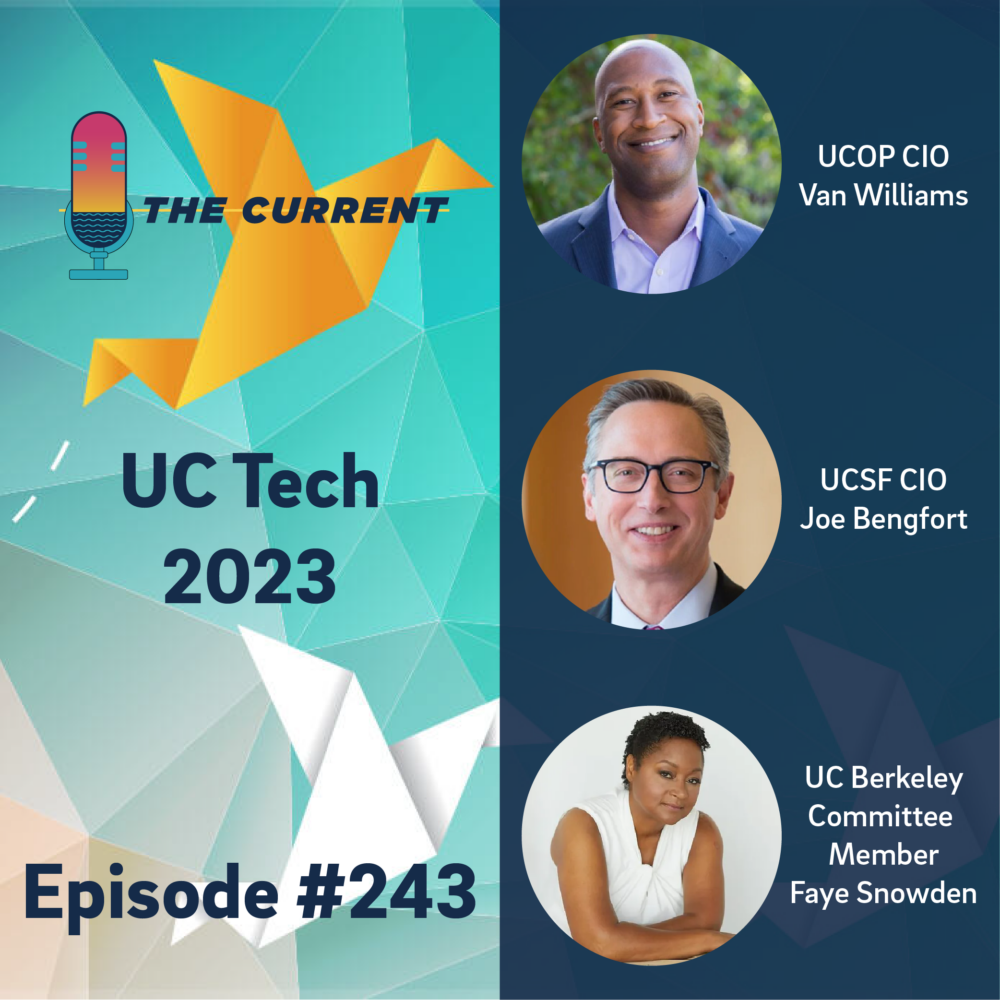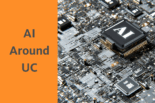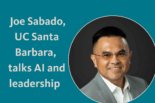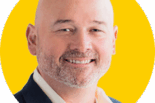This week, The Current at UC San Diego IT Services aired a podcast about the 2023 UC Tech Conference, featuring, Van Williams, University of California VP of IT and Chief Information Officer, Joseph Bengfort, CIO, UC San Francisco Medical Center and Campus, and Faye Snowden, Manager, Technology Program Office at UC Berkeley.
The panelists discussed:
- How work by members of the UC Tech community directly advances President Drake’s UC system goals
- How diversity defines the UC Tech community
- Opportunities to engage year round
- The overall vision for the UC Tech community
You can listen to the podcast here:
–
Transcript of the podcast
Miguel Rodriguez:
You are listening to The Current Podcast, the official podcast of UC San Diego’s IT Services Department. I’m your host, Miguel Rodriguez.
Today is Wednesday, May 17th, and I have very little news for our department this morning. In fact, none because I want to get to our very special episode. That’s right, it is a preview of the 2023 UC Tech happening in July at University of California, Berkeley, and we have got a whole collection of amazing guests to talk about it today. So without any further ado, let’s get to the show.
Thank you to all of you for joining us here at the Current Podcast for this special UC Tech 2023 preview episode. Now I’m honored to say we have quite an ensemble of esteemed guests and representatives to talk today about UC Tech and to start with no less than the University of California VP of IT and Chief Information Officer, Mr. Van Williams himself. Welcome to the current Van.
Van Williams:
Miguel. Thank you for having me. Great to see you.
Miguel Rodriguez:
Such a pleasure. Next we also have the Chief Information Officer for University of California, San Francisco, Joe Bengfort. Hi Joe.
Joe Bengfort:
Thanks, Miguel. It’s great to see you again. I remember your energy from UC Tech at San Diego last year and I’m still grooving on it.
Miguel Rodriguez:
I’m glad to hear it. I remember you on stage, so that was fun. And finally, one of the people tasked with leading this year’s conference, Faye Snowden is the manager of the technology program office at the University of California, Berkeley. Thank you Faye for taking time out of the insanity of event planning. I know that you know I know how you feel.
Faye Snowden:
Yes.
Miguel Rodriguez:
So thank you for joining us.
Faye Snowden:
No, thank you for having me.
Miguel Rodriguez:
So we’re going to start this off at a pretty wide angle with the concepts behind this event. And so we’re going to start with you, Van. As you know, I chaired UC Tech for 2022 and you and I had many conversations as well as Laurel and other people who may have been on this call, regarding when I took up that position, the overall vision, the purpose for UC Tech. And I know that you have taken that and really wanted to define that. So let’s give a brief description for our listeners of what you see as the central vision for UC Tech and the purpose as you define it yourself.
Van Williams:
Miguel, thanks for the question, and let me just say right now one more time to you and to Faye. What a labor of love it is that you all have taken on the work to convene the conference. It’s a tremendous asset to the community. And in fact, UC Tech is not just a conference, it’s a community. And when we think about that community, it’s a community of people that are not just IT professionals, it’s a community of people that are embedded within business units because increasingly, technology has gone well outside of the IT department. It’s also a community of people that are outside of even professional employees. It’s students, it’s folks that have aspirations to become technologists.
And we want to be a place where we can recognize all of those people. We can facilitate their growth, we can facilitate connection to each other and we can give them a place where they don’t have to leave to go into Silicon Valley or to go into media and entertainment if you’re down south. But they have an opportunity to do anything they possibly want in the UC because we have financial services, institution and UC investments, we have nuclear energy, we have a medical industry, we have a police department, a fire department, power generation. This is one of the most amazing places in the world and we want UC Tech to be the home to allow our amazing employees to really realize their dreams and be a big part of helping them to move on to their next steps in their career.
Miguel Rodriguez:
I just want to bring up and piggyback on a couple of ideas to clarify for some of our listeners and to connect, to use that word, to some episodes that we have with, I recently interviewed the manager of our service desk, which is central to UC San Diego, for building connections with our students, helping them connect to the inner workings of our university and find work after they leave. And so to hear you connect those concepts with UC Tech in that way is really wonderful. So I was applauding internally as you were talking, but also the thing that I love about UC Tech is it is a melding of all of the campuses, all of the University of California campuses to come together and brainstorm. And I have never really been involved in something that rich, since you bring up the University of California system as this force on the West Coast that connects to the real world.
I did want to bring up, you and I talked a little bit about the University of California priorities of President Drake. And so I wanted to bring those up a little bit because when I read them, they seemed to be part of a robust plan for the UC system to make literally a measurable difference in the world. And I don’t know if I’m going to go through all of them in this podcast, but I was wondering if you can talk about how such a massive undertaking like UC Tech relates to those presidential priorities that were put forth by President Drake in September of 2022.
Van Williams:
No, absolutely. So my first month on the job, I did a podcast with President Drake and with the CIO for UC Davis to invite President Drake to talk to the community, the UC Tech community. And back then he said access, affordability and excellence, and those were the priorities for the UC. And he’s since gone on to really talk about how do we make that a little bit more concrete? And he’s talked about it in the forms of expanding opportunity and excellence. UC’s ability to lead on climate change, UC’s commitment to building an inclusive, respectful and safe community, and then UC’s responsibility to promote health all across California, especially some of our most vulnerable communities. And the thing about the UC Tech community is that there is no other community that is as tied into advancing the UC’s priorities than UC Tech. If you think about opportunity and excellence and you think about it from the ability for us to close achievement gaps, the ability for us to support greater graduate student growth, offering debt free pathways, technology’s a part of all of that, we are the things that drive our mission systems.
We drive our ability to do effective advising, do data analytics to understand what types of interventions are actually needed, and the technology that we provide for our faculty members and the ability for them to execute on the excellence of their research is groundbreaking. The size of a HPC can make a difference between completing research in six years versus six months. And for every single one of those priorities, I believe the technology is not just an enabler for it, it’s an amplifier, it’s an accelerant. And to the degree that we can get our community engaged and really thinking at the level around the type of impact that the UC wants to make on the world and on California, we’re activating agents of change all across the board. And that’s really part of the goal for the community is really connecting us up. And we all recognize that we’re embedded within individual departments, we’re embedded within individual schools and we’re embedded within individual universities, but we are one part of one community and we need to support each other and we need to advance together.
Joe Bengfort:
I want to give an example here because within our health campuses the issue of access, which is essentially ensuring that our communities have expanded opportunities to receive care, that’s a huge issue and technology plays a tremendous role in it. And we know that, for example, the zip code you live in and your place on the economic ladder ultimately is a really accurate indicator for the healthcare you receive. And that’s a problem, a really important problem to solve. And it aligns perfectly with the President’s goal for expanding opportunities. So that’s how I see it applying in the healthcare space.
Miguel Rodriguez:
Yeah, thank you for that addition. Now I’m piggybacking on that with that information, Joe, especially from the healthcare angle, which we as we know is such a major asset to University of California system in general, UC, SD in particular. I do want to bring this up. It’s a bit of a surprise question, but you made me think of it, at the end of last year’s UC Tech, as committee chair, I indicated that one thing I wanted to see was some reflection between UC Tech’s of what kinds of things were learned and applied and I can see that coming to light with some of what you’re talking about Van, with building these connections, these collaborations and learning from them and spreading out. And I’m wondering, when we talk about an overall vision for UC Tech, if we see that as part of the process is taking what was learned at the event and measuring its application, if you will, as the years go by.
Van Williams:
So absolutely Miguel, I think you have hit the nail on the head. We learn a lot from the events, from the applications that are submitted for proposals. We get to understand what the competencies of our community is. We get to understand what the interest for it is. From the event organizers, we learn a lot operationally about the different types of ways that we can connect. We become better at using electronic mediums like Slack to really enrich our connections. For me personally, I’ve really centered around a few goals for the community. One is growth. We have probably about two to 3000 active folks engaged in the UC IT blog, which I like to think of as the UC Tech blog. We know that there’s at least 9,000 people that we identify as technologists across the system. My suspicion is that it’s significantly greater than that.
And so one measure of success and division for this is how do we get more engagement across the board and how do we really grow and accelerate that? Another measure of success is how do we enrich the programming that’s available for everybody? And so in partnerships with many of my CIO colleagues like Joe on the call this year, we’ve launched a UC Tech cyber leadership program. It’s the first program of its kind that we know of that integrates in not just Information Technology professionals in the form of security professionals, but it’s the tech adjacent people that we’re talking about. So we have privacy, we have audit, we have law enforcement, we have all of these folks that we engage with that we associate and we want to make them our own, right, engage. And that’s only really possible because we’ve been able to mine some of the events that we’ve seen.
We’ve seen the partners that people have brought into this space, and we’re looking for ways to really provide them with a greater level of glue, connectivity in the form of knowledge, in the form of shared models and vocabulary to make them a permanent fixture. And then every single year we’re trying to figure out how do we take some of the infrastructure that’s been repeated individually at a campus and how do we make that canonical so that we go from just having to do one event per year to multiple events per year and really starting to reach and differentiate the different parts of our community.
Miguel Rodriguez:
That is what I wanted to hear. Thank you. We are going to start focusing in a little bit on 2023, but before we do Van, I have to ask, this will be your first in-person UC Tech I believe, under your current role and what are you most looking forward to?
Van Williams:
Oh, I mean, it is for sure the people. I feel like the tech community, and maybe you alluded to this before, it’s a unique community because of the fact that people come here from all walks of life. I think you all know that I’m a classicist, the Latin and Greek guy by training. I have met people that have been opera singers. I’ve met folks that have come into tech because they have been engineers for submarines, but you name it, we have it within our community. I love meeting people, I love hearing their stories. I love my CIO colleagues giving me shit for breathing.
And you can’t get that unless you’re actually out there in person. And I’m also a hugger, but I always ask first and it’s just not quite the same. Being able to go out there and give a hug to somebody through a computer screen, especially when them for so long and yet, you know, don’t have a chance to see them in person. So by far and away I think the content is going to be amazing because it always is. But really it’s for me, it’s about the people.
Faye Snowden:
It is. Yeah. I love that you mentioned that there’s so many creative people in tech, so agree with that. Musicians, writers, I mean, like you said, all walks of life. It’s awesome.
Miguel Rodriguez:
Joe, you said something before, I think it got a little bit lost. I was wondering if you wanted to?
Joe Bengfort:
Oh no, I was just giving Van a hard time.
Miguel Rodriguez:
[inaudible].
Van Williams:
You’re starting early Joe.
Miguel Rodriguez:
It’s funny. I will just bring this up really off the cuff because I also came, I don’t know how I ended up in a technology department either. I’m a teaching and learning person, but also a film major and a classical literature major too.
Faye Snowden:
Yeah. Well, no, I’m an English major, but I have always been in tech. I started in the Navy and I actually worked with Submariners, so in the Navy. So this is different, but English has always been my second love and literature and things like that so.
Miguel Rodriguez:
Yeah, maybe we’ll hear a little bit about that later. But as we zoom in on this event, I’m going to move the conversation over to Joe. The first question is a big one for me now. When I talked to Faye last year, I knew that UC, Berkeley was starting to plan for UC Tech 2023, and this year has become a bit of a shared effort between UC, Berkeley and UC SF. So I was wondering how that campus partnership started and has been maintaining throughout this process.
Joe Bengfort:
Yeah, sure. Well, it’s like most good ideas. It happened pretty much by chance. Jenn Stringer, who’s the outgoing CIO at UC, Berkeley and I were at a IT leadership council event. Can’t remember what event it was, but I jokingly said to her, “Hey, we’re just across the bay and maybe we could participate in some way in representing health sciences.” And Jenn, right? Really, really shy. And she said-
Miguel Rodriguez:
I’m going to miss Jenn. I’m going to throw that out there. I love Jenn.
Van Williams:
Me too.
Joe Bengfort:
No question. But she jumped all over it and she was like, “Wow, that’s a great idea. Maybe co-sponsoring that’d be great.” It’s decided I need you to join a meeting next week. And then it’s like off we went.
Faye Snowden:
Yeah.
Joe Bengfort:
And I will quickly say that the Berkeley team led by Faye have really carried a lot of the weight in preparing for this event. But my team’s been engaged in assisting in planning and getting volunteers and sessions and all that stuff. So my contribution, by the way, I do want to say I did have a contribution, even though I’m like have one of those empty suit jobs. I suggested that we rent a big boat and load everybody onto it and floated out into the bay in between San Francisco and Berkeley, the evening award ceremony. And they all looked at me like I was crazy because I was, something about money.
Faye Snowden:
Shuttles.
Joe Bengfort:
We couldn’t get network. And then somebody got worried about, oh my God, what if the boat goes under and we lose all this talent, so we won’t be doing that.
Miguel Rodriguez:
[inaudible]
Faye Snowden:
You made me very popular in the programming committee meeting, when you brought it up.
Miguel Rodriguez:
I started to get really excited.
Joe Bengfort:
I didn’t get invited to the next meeting.
Faye Snowden:
So yeah, Joe’s team, it’s been great. And it is not only the effort that they put into it helping us get sponsors, but also the ideas that they had that we’re using. We use Joe’s and his team’s idea on how to do our proposals and how to accept proposals and how to do the tracks and assigning track leads and things like that that we wouldn’t have had thought of without their input. So that was the best part I thought, is being able to share their ideas.
Miguel Rodriguez:
Yeah, it’s really incredible how much an event comes together once you have really outstanding presentations to share.
Faye Snowden:
I know, yeah.
Miguel Rodriguez:
That’s so much is just like, oh, this is what it’s going to be, it’s what comes from the community. And it’s no surprise once it happens, but all of the panic before you get them alleviates immediately when you have, well, here’s our content. It just rocks. Right Joe, no Alcatraz awards? You couldn’t set that up? I am curious in your position as a chief information officer as well as all of hats you wear as leadership for your campus and your community and the UC Tech community. We talked with Van a lot about aspirational goals for an event like this. I want to hear from you about your own.
Joe Bengfort:
I guess I’d start, for me personally, I’m naturally a bit of an introvert and maybe it doesn’t come across in this, but I am, it takes a lot of energy for me to be around people. I love solitude. But every year I’ve gone to this for several years in a row and every year I just get this sense of gratitude for the community I’m a part of that is just bigger than, I mean UC SF is a big deal and there’s a lot of great things that happened, but when you open the aperture and you start to see everything that’s happening in the different parts of the institution, it really reinforces a sense of purpose for me. And so it reminds myself why I’m banging my head against the wall on all these problems every day. It really helps to just inspire me.
So that’s a big part of it. As far as what we’re trying to do as a partner in this, we’ve really served as a portal to the rest of the UC health system to just ensure that the health mission and the work of, well, the many health IT professionals that are in the system that their work is represented and shared. But that’s an important part of our role and that’s not just for patient care. I mean, we look at this very much as health sciences research and education as well. So our schools of medicine and pharmacy and nursing and dentistry and just making sure they’re all represented is super important to us. So yeah, that’s it. I’m really excited to say we’ve got a lot of sessions coming from the health sciences community and patient care, so should be a great time in that regard.
Van Williams:
Hey Miguel, can I add one thing just because I think it’s actually really an important one from a Joe perspective. So maybe I’ll add three things. One is Joe leans so heavily into the UC Tech community. All right I mean, he really does. And one of the things that I’ve found in terms of my aspiration for the community is to be able to have the type of community that I get from my CIO colleagues. Joe is as much a therapist to me as he is a truth speaker. He’s a visionary, but he’s also a person that is grounding and into the practical set of things.
And because of that relationship, because of the relationship that he and I have with all of our other colleagues, we’re able to really identify the things that are unique that folks do at campuses and really look for those opportunities to synergize and to help each other and to engage. And that’s what we really want the community to be for each other, this support network, this place for advancement. And I just want to emphasize that fact of, that is a choice that Joe has actively made because his job is a huge one, but every day he actively says that I believe I’m part of this community and it’s worthwhile for me to give of myself right towards it because it makes it better for everybody else.
Joe Bengfort:
You’re very flattering. Thank you for that.
Miguel Rodriguez:
Yeah, I wasn’t going to say no, but no, I actually agree a lot with what you said. And in terms of leadership and people actually across the tech industry spectrum in our university system for doing these types of events or anything like it that is extracurricular to our day-to-day, but contributes in my esteem so much to our day-to-day. One quick question, Joe, for you, you made me think of it with some of your aspirations. This is partly me coming off of doing process palooza and thinking about Lean Six Sigma and Rework and stuff. Have you ever had an experience where you were working on a project or a challenge as a CIO or in a tech professional and gone to an event like UC Tech or maybe UC Tech itself and discovered some other department in some other school in your same system, had already found the solution and you could then apply it?
Joe Bengfort:
And you’re going to ask me for examples, but I think I should broaden your question a little bit. Certainly at UC Tech, you get exposed to people working on similar problems even in different parts of the mission that you can leverage. Last year it was in the space of recall, there was a lot going on with megapixel and analytics on websites and all of that business. And not only did I get information from other campuses and how they were approaching it, we were doing a lot that I could share. And I happened to sit down at lunch with the folks from FireEye.
I didn’t even know Mandy at FireEye, I didn’t even know it was them. And I think it was two months later, they came out with their scanning tools for us to use. So just those happenstance connections really do work, but they work beyond that too. The UC health CIOs and CTOs and application directors get together quite frequently over the course of the year. And we just see that happening over and over. So I agree strongly with something Van said earlier is finding ways to increase the surface area from across the campus over the course of the year, should be an ambition of ours.
Miguel Rodriguez:
That’s the thing that I think an event like this can really lead to. So when I come up with questions off the cuff that I did not send to you in advance, sorry, but not sorry. I think it’s great information.
Joe Bengfort:
No problem.
Miguel Rodriguez:
All right. We’re going to zoom in even closer. We’ve got UC Tech 2023 coming in July, and registration just opened. So what is going to set this year aside? Faye Snowden, I’m going to ask you, we’ve got a theme.
Faye Snowden:
Yes.
Miguel Rodriguez:
So I’m going to ask you, what is the theme and what are your feelings about it? What is your outlook about what this year is about?
Faye Snowden:
Well, I am just happy to be talking about this theme on the day that the CDC has declared an end to our public health emergency. So our theme this year is resilient, rising, and re-inspired. So I think that when we were talking about coming out of Covid, I remember some of my friends saying, “I’m not ready.” I still have a lot of emotional things to process from coming through these years. And a lot of us, we had health problems ourselves, we lost loved ones. It was a very turbulent time for our country and for our higher education in particular because of the way we had to pivot. So it’s really good, and I do this in my personal life too. It’s when you’ve gone through something really, really hard. My kids are grown now, but I have a teenage son and we had some issues when he was a teenager.
And now I look back on that and I say to myself, I don’t even know how I made it through it. I don’t know how I did it. But this year’s theme for UC Tech is going to allow us to sit back and think about everything that we’ve been through, the resilience and the fact that we’ve come through that. And some of us didn’t make it, but the people that did, we’ve come through that and now we’re starting to rise. Use the strength that we gained during those hard times to rise and also be inspired or re-inspired or whatever we want to call it, to even reaching new heights. There’s no telling what we can do now. And it’s so funny because I remember when I used to be over at networking years ago, we were debating on how we should implement some package shaping software.
And we had all these project plans and we were ready to go, and then our packet shaper went down and we had a new package shaper up in a weekend. And I’m like, how the heck did that happen? But this is a micro level, but on a macro level, I feel that’s what our higher education institutions did. We had virtual classrooms, virtual remote work, and all these, this technology up and running to support this new world in a metaphorical weekend. So that’s what I feel that this theme, it’s allows us to reflect on that and to also honor our own strength and where we’ve been and to even go further.
Miguel Rodriguez:
Well, I got to say, as one of the people who was on the team that wrote UC, San Diego’s Return to Learn strategy for instructors, I really appreciate that because that was murder.
Faye Snowden:
Yeah.
Miguel Rodriguez:
So thank you. That was quite an experience back in the spring of 2020. But no, I love the theme. It’s a very people and culture oriented theme, but could be taken to, like what we did with connections last year, is it can be interpreted across the board from people and culture to the technical.
Faye Snowden:
Right. And remember, I always look at technology is that, we’re not here to serve technology. To me, the technology is the underpinning that supports our community, our people and culture or aspirations, where we want to go. So that’s what I’ve always looked at technology like that as well. There’s no tech unless you’re watching the movie like 2020, I can’t do that [inaudible]. But the technology, I don’t know, but you can’t let the technology overtake what you’re trying to do as a community and what’s right for that community, I don’t think anyway.
Miguel Rodriguez:
Yeah. Well, you’re reminding me that I just read Joe’s ChatGPT announcement on the…
Faye Snowden:
Yeah.
Miguel Rodriguez:
But anyway, hey, let’s go full advertisement mode here, Faye. So what should get people off their butts and registering right this second?
Faye Snowden:
Okay. Think about what you’ve been through. You’ve missed those, Van said he’s a hugger. You’ve missed those hugs. Being with people. I say the first thing, when I saw this question in advance, I did see it in advance. I was thinking the humanity, just going to a place where you see people, some that you haven’t seen in years, you’re meeting new people, you’re understanding the challenges that they’re going through and also the joys and triumphs that they have had and that some of those challenges are yours. And you can exchange ideas and just to be with your colleagues across UC Tech. The other things are, and I loved Van and Joe when they talked about some of the pivots that we’ve had. And for example, we have a great keynote speaker, John O’Brien, the president of EDUCAUSE, has come to us and talk about that other transformation.
We talk about this importance of a digital transformation, but because of what we’ve been through as a world these last years, now we need to shift to another transformation for taking care of our people, making sure we have safe spaces and places where people can do their best work. So John is going to talk to us about how that transformation is just as important as a digital transformation. And then I am so excited that we’re going to have an equity and healthcare keynote panel, something that is near and dear to my heart, that Joe is putting together with a team of very talented people to talk to us a little bit more about that.
And especially in my life where I’ve actually seen people be denied care because they don’t have the money. For example, I know someone who’s very close to me who couldn’t get her cancer treated until she showed the doctor like thousands of dollars. So we had to, as a family, go in and get that money together for her to have some lifesaving treatment. And there are all types of research out there about how medical devices work on people that have different skin tones and that type of thing. I don’t know, Joe, if that’s what the panel’s going to be about. I will take anything, but I am so excited that we’re going to have that panel.
Joe Bengfort:
Well-
Faye Snowden:
That’s why you should go.
Joe Bengfort:
Just to give you a little bit more on that, it’s a digital health equity sort of concept. So the blending of technology and access, which we mentioned earlier in the call, and we don’t want to propagate the barriers that people see in the physical world to the digital world. And that’s a really easy thing to happen. So we’ve got panelists that come not from IT, but from the healthcare space and the research space out of UCLA, out of UC, San Diego Health and out of UC SF. So it’s a great panel.
Faye Snowden:
So that’s why people should get up off their butts and go.
Van Williams:
Hey, thank you for using my terminology. I like that.
Miguel Rodriguez:
Well…
Joe Bengfort:
You forgot to mention something here.
Miguel Rodriguez:
Yes?
Joe Bengfort:
Berkeley is legendary, right? The number one public [inaudible].
Faye Snowden:
Yes.
Joe Bengfort:
America since forever. And just the history and energy of the whole place is inspiring.
Faye Snowden:
It is.
Van Williams:
Miguel, can I add a couple of the things I’m looking for forward to, which are really honestly just, it’s a great opportunity to learn from some of your colleagues, but also just if you look at the themes that are happening this year, I think that they’re themes that are really near and dear to what’s on a lot of our minds. So we have some great stuff around women in tech, quite a bit of stuff around equity and diversity. I am a user experience fanboy, and it’s fantastic to see some of that content this year growing more and more. But if I were to go out there and actually just pick one event that I’m looking forward to, selfishly, I’m going to say it’s actually the UC Tech Awards. And it is partly because I got a chance every year to look at all the awards that come through.
And I know just what the amazing amount of work is and how hard it is to make a selection around it. But it’s also, because this year we have a couple of new awards. One is a diversity equity and inclusion leadership award, which is the first time we’ve had that inside of the UC Tech community. We also have a sustained impact award. And then of course, last year we introduced the Amini Award for Operational Excellence for Mojgan, who is, as you all know from last year, just amazing. And then the Yvonne Tevis Award for UC wide collaboration. And so just being able to see the things that are coming and happening all across the system, and to see people be recognized in a community of peers for just doing amazing work, right. That’s inspiring and I can’t wait for it.
Miguel Rodriguez:
To piggyback off of that, I got to say after last year, being exposed to candidates for those awards and seeing the mind-blowing stuff, it’s really humbling to see just what is being done on a daily basis throughout our system. And then I have conversations with faculty and researchers, and when people wonder like, what is the real purpose of the university? Is it to teach? Is it research? Is it health? [foreign language]. It’s everything. Right?
And to see that in carved in stone with these, I mean, not just the award winners, but the things that are put up for nominations by their peers, which is an even more important thing to point out, is really humbling and makes me want to wake up and go to work every day. So I want to thank all of you for showing up to our podcast to talk about things like UC Tech and what makes it such an important event, important enough that it has survived the hard work and tempest of 11 campuses for over 40 years and will continue to. I know I will be in Berkeley in July, and I’ll look forward to seeing all of you. And thank you again for showing up and talking to us about it.
Van Williams:
Thank you, Miguel. Thank you again, Faye, for doing all this hard work and Joe for being a cohost.
Faye Snowden:
Oh, you’re welcome.
Joe Bengfort:
Van, you’re awesome.
Miguel Rodriguez:
I sure hope you’re enjoying this podcast. Remember to let your fellow IT Services staff members know that this podcast exists. Get everyone to subscribe on iTunes, Stitcher, or wherever you can get your podcasts. This podcast is a collaborative effort and we want to hear from you. If you have any ideas for podcasts or topics, send them to me at its-podcast@ucsd.edu. That’s it for today. Keep an ear out for the next episode of The Current Daily.







